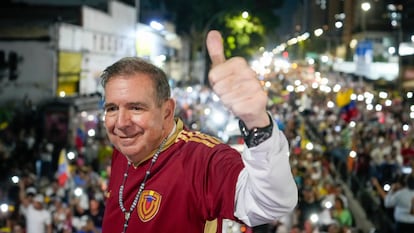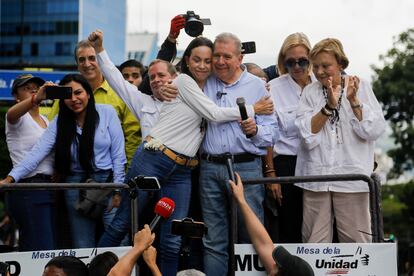Chavismo intensifies its judicial persecution against Edmundo González Urrutia
The opposition candidate has been summoned to appear before the Prosecutor’s Office and faces an arrest warrant if he does not comply. The government accuses him of conspiracy for having published the voting records with which he claims victory over Nicolás Maduro


On Friday, the Venezuelan government’s persecution of the opposition reached a new stage. At 10 a.m. Edmundo González Urrutia was summoned, for the third and final time, to appear before the Chavismo-controlled Prosecutor’s Office as a suspect for crimes of conspiracy, usurpation of functions and instigation to disobedience, among others. The summons states that if he does not attend the scheduled appearance, an arrest warrant will be issued, under the presumption of risk of flight and obstruction of justice. Chavismo has entrenched itself in its most repressive facet to corner the opposition following the disputed presidential election of July 28, as it has done on other occasions. The political climate in Venezuela continues to be one of maximum tension.
On the same day as the summons was issued, González Urrutia completed a month of isolation in a secret safe house. His last public appearance came on July 30 at an opposition rally in front of the United Nations headquarters in Caracas. Opposition leader María Corina Machado has also assumed a kind of clandestinity, with fleeting appearances at the three protest rallies she has organized in Caracas over the last month. Machado has issued warnings about the new red line the government could cross in the next few hours, if González Urrutia’s house is raided, or if he is arrested.
The opposition coalition candidate has cited the lack of independence of the judiciary and in particular that of the Attorney General, Tarek William Saab, as reasons for not submitting to the process. “The prosecutor has behaved, repeatedly, as a political accuser,” as he “condemns in advance and now pushes for a summons without guarantees of independence and due process,” Urrutia said this week in a video posted on his social networks. “The Public Prosecutor’s Office intends to subject me to an interview without specifying in what condition I am expected to appear and pre-qualifying the crimes not committed.” González Urrutia did not appear at a first summons on August 26. Nor did he do so on August 27.

The opposition candidate also failed to appear before the Supreme Court a few weeks ago, when a supposed expert appraisal of the election documents was carried out to validate the result announced by the National Electoral Council (CNE), which is also subordinated to Chavismo and handed President Nicolás Maduro victory. The authorities have yet to present, a month after the election, the voting figures broken down table by table, which has cast doubt on their veracity. The ruling did not resolve the doubts about what happened after the vote count on the night of July 28, but among the court’s decisions was to declare González Urrutia in contempt of judicial authority.
The former diplomat — who turned 75 on Thursday and thanked supporters on social media for the congratulations he received “amid difficult times” — has gone from being almost completely unknown in Venezuela a few months ago to becoming a chief enemy of Chavismo. Throughout the campaign he was the target of attacks from the government apparatus but the threat to block his candidacy – he was the second option after Corina Yoris - to replace Machado, who was elected by an overwhelming majority in the opposition primaries but unconstitutionally disqualified by the Supreme Court, never materialized. Now, amid suspicions of fraud over the results announced by the CNE, the entire judicial apparatus is after him.
The Public Prosecutor’s Office has classified the publication of the voting records that the opposition posted on a website, Results With Venezuela, as a crime, and has already described them as false. The records are a public document, several copies of which are printed by the voting machines and then retained by the electoral authorities, the military that guard the electoral material, and the witnesses of each party. The opposition prepared to quickly collect and scan these documents, with which it can confirm that González Urrutia won with 67% of the vote, according to 83.5% of the records obtained by its witnesses. In other elections, such as the one in which Maduro faced Henrique Capriles in 2013 and won by a narrow margin, Chavismo published the records they had in their possession on the website of the ruling United Socialist Party of Venezuela (PSUV).
From Maduro on down, Chavismo is calling for jail for its electoral rival. This week, the president warned that González Urrutia was planning to flee the country. “He won’t show his face,” he said at an event with his followers at the Miraflores Palace, the seat of government. The judicial persecution that Chavismo has undertaken against other opposition leaders has driven them into exile, as happened with Juan Guaidó, who challenged Maduro in 2019 with an “interim presidency” that led to the international community rejecting the president’s 2018 reelection, in which the opposition was practically prevented from participating. A large part of the leadership of opposition parties such as Voluntad Popular and Primero Justicia has fled the country after years of persecution. In recent weeks, Maduro has constantly compared González Urrutia to Guaidó, and has predicted the same fate for him.
At the beginning of the year, Maduro’s security forces went after Machado’s inner circle, as she was the new leader of the opposition. Henry Alviárez and Dignora Hernández, her main aides, were arrested in March and another group had to take refuge in the Argentine embassy and are now under the protection of Brazil after the recent breaking of diplomatic relations between Caracas and Buenos Aires.
The harassment has intensified since the election. On Wednesday, at the end of a rally in Caracas, the police arrested Biagio Pilieri, from the Convergencia party, after a car chase through the capital. This week Perkins Rocha, Machado’s lawyer, was also detained. Other opposition figures who have been arrested in recent weeks include Freddy Superlano, William Dávila, Roland Carreño, and Américo De Grazia, as well as human rights activists, journalists and more than 1,000 people who have demonstrated against the election results.
Sign up for our weekly newsletter to get more English-language news coverage from EL PAÍS USA Edition
Tu suscripción se está usando en otro dispositivo
¿Quieres añadir otro usuario a tu suscripción?
Si continúas leyendo en este dispositivo, no se podrá leer en el otro.
FlechaTu suscripción se está usando en otro dispositivo y solo puedes acceder a EL PAÍS desde un dispositivo a la vez.
Si quieres compartir tu cuenta, cambia tu suscripción a la modalidad Premium, así podrás añadir otro usuario. Cada uno accederá con su propia cuenta de email, lo que os permitirá personalizar vuestra experiencia en EL PAÍS.
¿Tienes una suscripción de empresa? Accede aquí para contratar más cuentas.
En el caso de no saber quién está usando tu cuenta, te recomendamos cambiar tu contraseña aquí.
Si decides continuar compartiendo tu cuenta, este mensaje se mostrará en tu dispositivo y en el de la otra persona que está usando tu cuenta de forma indefinida, afectando a tu experiencia de lectura. Puedes consultar aquí los términos y condiciones de la suscripción digital.








































